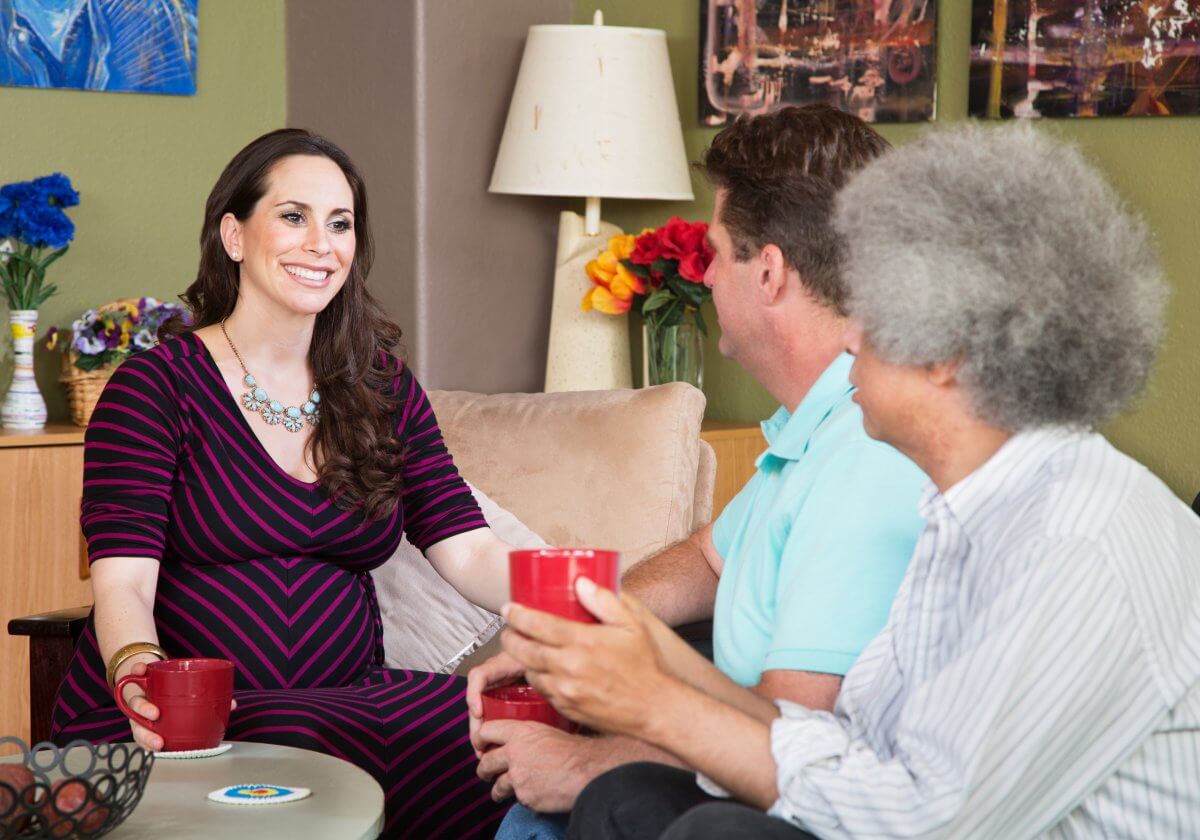Surrogacy can be a beautiful journey, and it is becoming more common, but not everyone is familiar with the process. Sharing the news with friends and family can be an exciting step, but it can also bring up questions and conversations.
This guide can help you talk about your surrogacy decision with friends and family. You can connect with the surrogacy community through our Instagram.
You can also call 1-800-875-BABY or click here to talk to a surrogacy professional and get guidance on sharing the news with friends and family.
How to Share Your Good News
How you share your news of surrogacy is totally up to you, and you have some options:
Sharing One-on-One
Sitting down with each person individually in a comfortable space can give you time to talk through any details. This can be a great way to share news with people close to you so that you can give them space to feel included in your journey and give them an opportunity to show their support for you.
This can also be a great strategy if you think someone may have questions or concerns so that you can address them fully and allow them space to share their thoughts and feelings with you. You can also choose who exactly you want to tell and keep the process as private as you would like.
Sharing Through a Social Media Post or Pregnancy Announcement
When it comes to sharing with a lot of friends and family, social media posts or pregnancy announcements can be a great way to get the word out to everyone.
If you choose to share through a social media post or pregnancy announcement, it means that all of your family and friends can feel included in your journey, and it can also help you out later on when the new baby comes—since you won’t be showing a baby bump, it can keep people from being surprised by the new addition to your family.
This choice can allow you to get creative in announcing the pregnancy, and you may even choose to include your surrogate so that people are aware of your journey. It also gives people an opportunity to come to you if they want to talk to you more about surrogacy.
Those who have any questions or negative thoughts may have the space to do research or collect themselves before they talk to you, so you may have more productive conversations, and if they have negative things to say, they may not go out of their way to talk to you.
Sharing at a Dinner or Gathering
Another great strategy for sharing your announcement is to share the news while your friends and family are gathered. Sharing in person can make the news feel more personal and special rather than sharing it over social media or in mailed announcements.
Sharing in a group can be even easier if you tell a friend or two ahead of time because you will know that you have supportive people by your side. When you are surrounded by supportive people, anyone who might have something negative to say may keep their thoughts to themselves.
Answering Some Common Questions
Coming prepared with answers to common questions may help you prepare for announcing your surrogacy. We have included some below.
Why?
Asking why you chose surrogacy may be a sensitive subject, especially if you have personal or medical reasons for choosing surrogacy that you don’t want to share with friends or family.
Remember that you are empowered to share your journey in the way that is most comfortable for you, and no one is entitled to know your personal or medical history. Something as simple as “We are excited to grow our family, and this is a great way to do it.” can be just as effective as a more in-depth answer.
If you are comfortable, sharing more information with friends or family may be a great way to include them in your journey. Having a one or two-sentence explanation for why you chose surrogacy can help you if you are nervous about getting the “why” questions.
Some examples:
“We had embryos left from IVF and were excited to have a child.”
“We wanted to have a child, and after reflection, we decided surrogacy was our best option.”
“It’s been a long journey to have a child, and it led us to surrogacy.”
“We learned more about surrogacy and found that it was a great option for us.”
Will Your Surrogate Share DNA with Your Baby?
In modern surrogacy, your baby will not share DNA with your surrogate. You can simply say “no.”
How Does it Work?
This kind of question can come in many forms. Some may ask you about generalities or specifics. In some cases, people may even wonder aloud about whether there was intimacy involved with your surrogate.
These questions can sometimes be said without thought, but the questions almost always come out of genuine curiosity. You can read articles on how the process works and explain as much as you want, or you can share articles and resources that they can read themselves. With the wide variety of information available online, you only need to share what you feel comfortable sharing.
How to Deal with Potentially Unsupportive Friends and Family
If you are expecting a friend or family member may not be supportive, talking one-on-one with a supportive partner or friend by your side may help you feel comfortable.
It may also be helpful to remind yourself that this may be a new process for friends and family, and they may be learning, so try not to take questions or their emotions personally. Their first reactions are not necessarily a reflection of their long-term support or feelings on the subject.
Get Help from a Surrogacy Professional
Surrogacy professionals can help you during every step of your surrogacy journey, including announcing the decision to family and friends. You can call 1-800-875-BABY or click here to get help from a surrogacy professional now.









![How We Reduce Surrogacy Wait Times [In 2 Valuable Ways]](https://www.americansurrogacy.com/blog/wp-content/uploads/2022/08/lower-wait-times-1200x801.jpg)